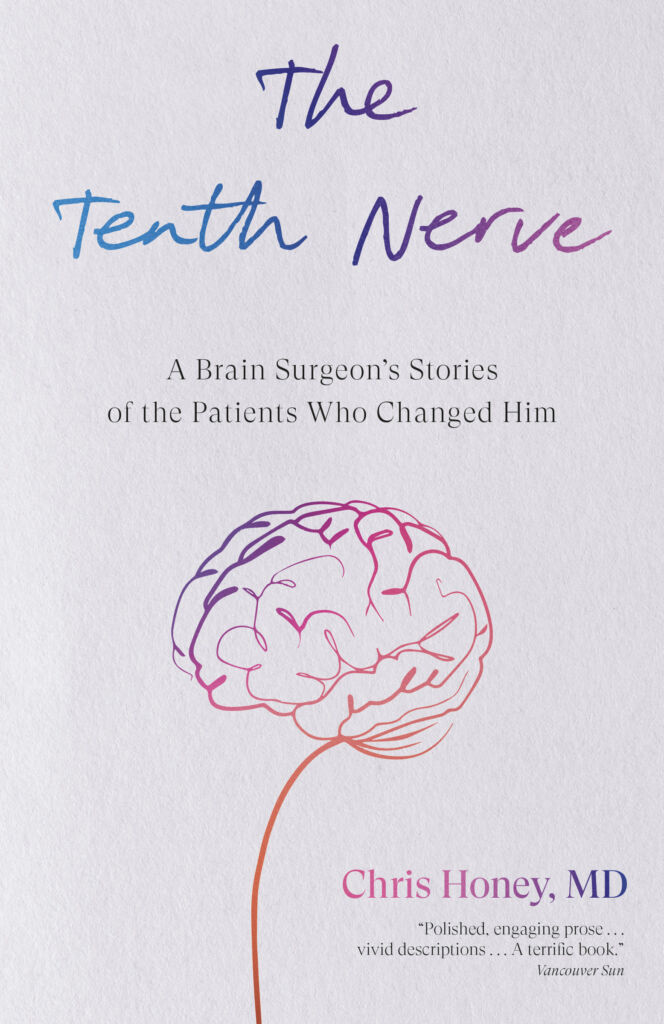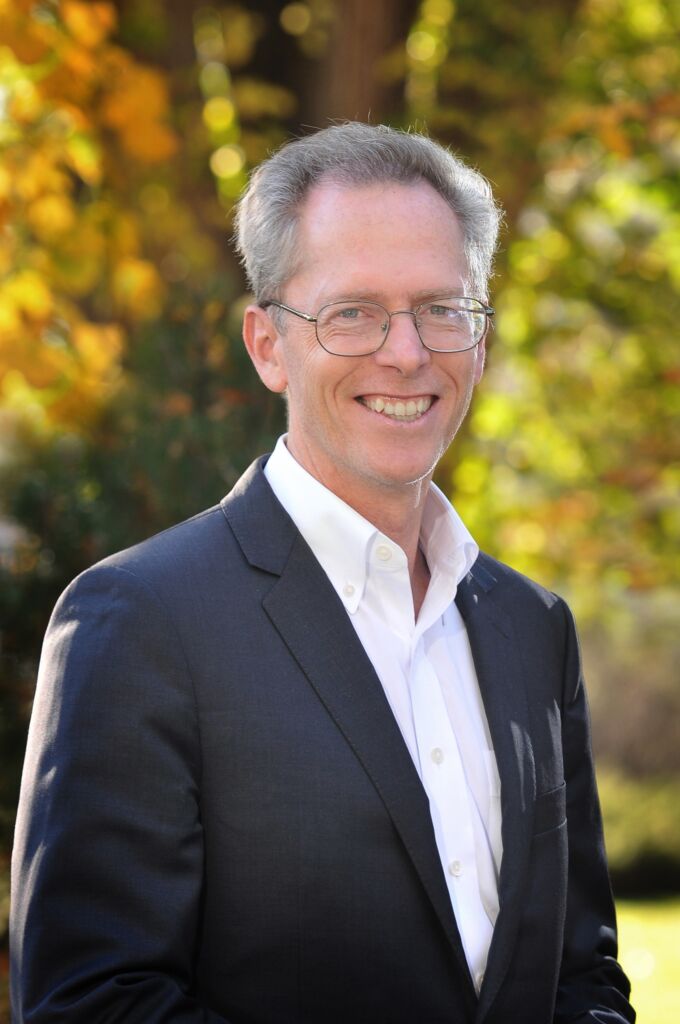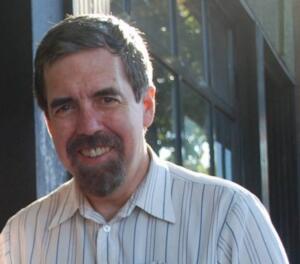It’s all in your head?
The Tenth Nerve: A Brain Surgeon’s Stories of the Patients Who Changed Him
by Chris Honey, MD
Toronto: Vintage Canada (Penguin), 2023
$23.00 / 9781039001183 (paperback)
Reviewed by Sheldon Goldfarb
*

The tenth nerve is the vagus nerve, one of several connecting to the brain (it turns out there are twelve, and there are others connected to the spinal cord, but they don’t figure in this memoir from Chris Honey, who is a brain surgeon at the VGH and UBC). Dr. Honey made an interesting discovery about the vagus nerve just a few years ago: if it gets tangled up with a blood vessel, it can malfunction and cause periodic choking or episodes of coughing.
He even named a syndrome after it, with the acronym HELPS for hemilaryngopharyngeal spasm. He also discovered another syndrome which he named with the acronym VANCOUVER (I won’t burden you with what that stands for), but more important, he cured the patients suffering from these – by going inside their skulls and disentangling nerves and blood vessels, and oh, it’s a bit unsettling, making you think, I never want to have brain surgery done on me.
If something goes wrong, of course, that’s it – it’s not like going back and revising a book review. Which is why, says Dr. Honey, that brain surgeons develop nasty tempers (not that he seems to have one) or numb themselves by becoming something like cowboys in the operating room, just ripping out tumours when they’re not yelling at the nurses.
But then there are the patients, the ones Dr. Honey said helped change his life, like Emily, who wouldn’t take “It’s all in your head” for an answer when she showed up at emergency rooms with one of her choking fits. There are psychosomatic illnesses, says Dr. Honey, but Emily was right: this wasn’t one of them. This was the case in which he identified HELPS, and cured Emily.

Medicine gets stuck in its ways, Dr. Honey says, more interested in curing what it can understand than in exploring what it can’t. In the old days people with inexplicable disorders were said to be afflicted by the gods or evil spirits. Nowadays the equivalent seems to be “It’s all in your head” – but sometimes it isn’t, sometimes there’s a blood vessel getting in the way of a nerve, and you need a brain surgeon like Dr. Honey to set things straight.
Then there were the patients like Saika in Liberia, where in fact it was a local doctor who taught him an important lesson: there’s more to medicine than surgical technique, and even if you fail, it’s good to have tried: you may have some other positive effect beyond saving the patient.
There is the whole issue of doctor-patient relationships: medical schools teach aloofness, there are dangers in getting too involved, but on the other hand you don’t want to be just a tumour-ripping cowboy – though one of the most gripping chapters here is precisely about ripping a tumour out of someone’s head, which then led to inexplicable seizures, which led to Dr. Honey becoming friends with the patient and joining his soccer team. A bit odd, especially since we never learn what caused the seizures (another inexplicable disorder?), though this does lead us to the history of seizures and epilepsy, a bit of a digression, but okay. And it does raise the thought: Why is Dr. Honey letting this patient play soccer: isn’t heading the ball a bad idea if you have a brain condition? Oh, well. They did win a championship, and the patient seems to be okay.
Occasionally, we get too much medical jargon, and though it is interesting to see up close the details of what goes on in preparing for surgery, it comes at the wrong moment here, just before we are going to solve the mystery of Emily’s choking fits. Still, this is a pleasant memoir that teaches about medicine (drilling beneath the skull is not necessarily brain surgery; the Incas did that to relieve pressure, but that’s not the same as operating on the brain), and it also reveals one man’s journey to neurosurgery, fuelled originally by his interest in the brain.
Aren’t we all interested in the brain, he says? Perhaps we are, wanting to know how thoughts and feelings get created, or just hoping that maybe there’s some cure lurking out there for whatever ails us. If only we can find the right blood vessel and the right nerve …
*

Sheldon Goldfarb is the author of The Hundred-Year Trek: A History of Student Life at UBC (Heritage House, 2017), reviewed by Herbert Rosengarten. He has been the archivist for the UBC student society (the AMS) for more than twenty years and has also written a murder mystery and two academic books on the Victorian author William Makepeace Thackeray. His murder mystery, Remember, Remember (Bristol: UKA Press), was nominated for an Arthur Ellis crime writing award in 2005. His latest book, Sherlockian Musings: Thoughts on the Sherlock Holmes Stories (London: MX Publishing, 2019), was reviewed in the BC Review by Patrick McDonagh. Originally from Montreal, Sheldon has a history degree from McGill University, a master’s degree in English from the University of Manitoba, and two degrees from the University of British Columbia: a PhD in English and a master’s degree in archival studies. [Editor’s note: For The British Columbia Review, Sheldon Goldfarb has reviewed books by Andrew Platten, Marcello Di Cintio, R. F. Vincent, Nick Marino, Joel Heng Hartse, Sebastien de Castell, and Esmeralda Cabral and he has contributed a comedic poem, “The Ramen,” based on Poe’s “The Raven.”]
*
The British Columbia Review
Interim Editors, 2023-24: Trevor Marc Hughes (non-fiction), Brett Josef Grubisic (fiction)
Publisher: Richard Mackie
Formerly The Ormsby Review, The British Columbia Review is an online book review and journal service for BC writers and readers. The Advisory Board now consists of Jean Barman, Wade Davis, Robin Fisher, Barry Gough, Hugh Johnston, Kathy Mezei, Patricia Roy, Maria Tippett, and Graeme Wynn. Provincial Government Patron (since September 2018): Creative BC. Honorary Patron: Yosef Wosk. Scholarly Patron: SFU Graduate Liberal Studies. The British Columbia Review was founded in 2016 by Richard Mackie and Alan Twigg.
“Only connect.” – E.M. Forster